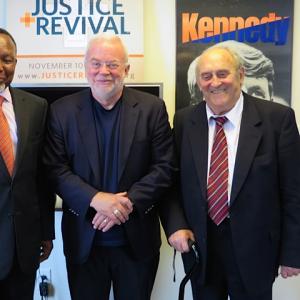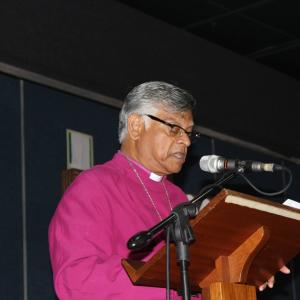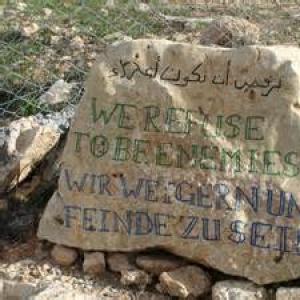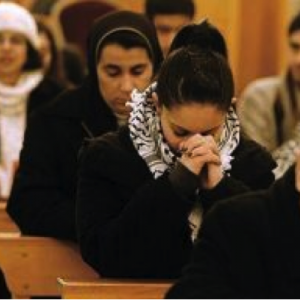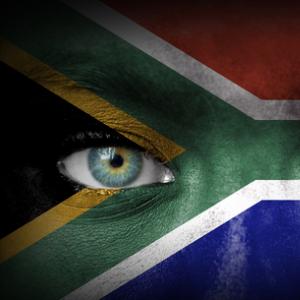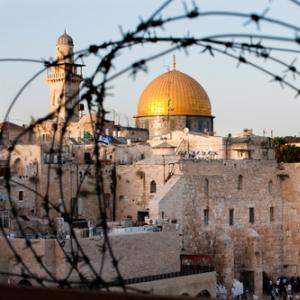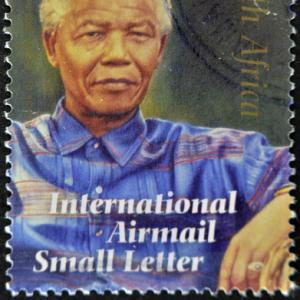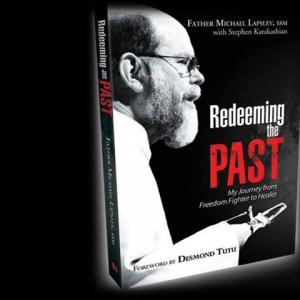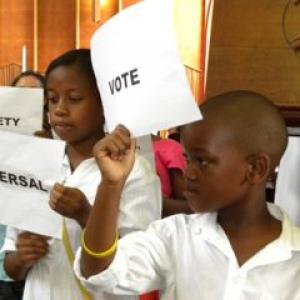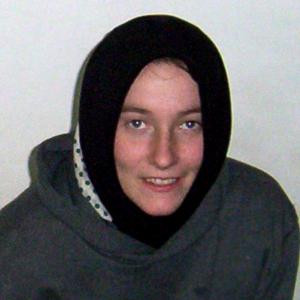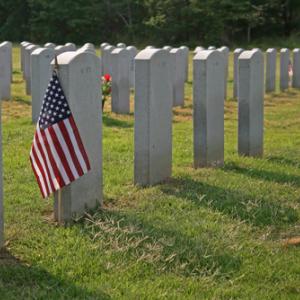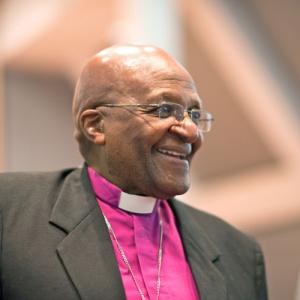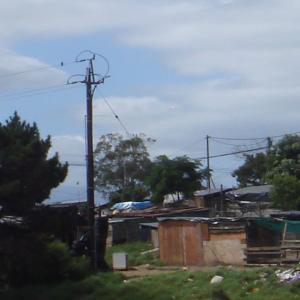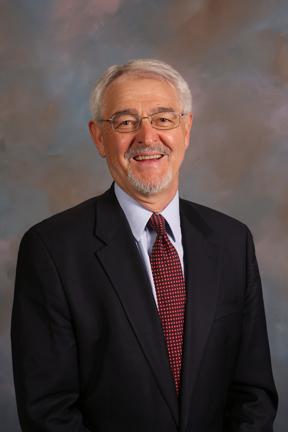
Thomas Getman is president of a private consulting group that specializes in international, United Nations and Non Governmental Organization affairs and university seminars and workshops on UN Reform and humanitarian interagency partnership building. He was World Vision’s executive director for international relations with tenure until March 1, 2009. In this role, he managed World Vision’s liaison activities with the UN and the World Council of Churches and was responsible for diplomatic relations with UN government member missions in Geneva and with countries on sensitive tax, staff and protocol negotiations.
He served until 2009 on the board of principals for the UN Deputy Secretary General for Emergency Relief in the UN Office of the Coordinator of Humanitarian Affairs (OCHA) and as chair of a premier NGO consortium the International Council of Voluntary Agencies (ICVA).
From 1997 to 2001, Getman was director of World Vision’s programs in Jerusalem, the West Bank and the Gaza Strip where he was responsible for a staff of 30 and $5-8 million a year in relief and development projects in Palestine, Israel, Jordan, and advocacy for peace with justice.
Previously, Getman served for 12 years as director of government relations and special assistant to the president of World Vision United States at which time he founded WV’s office in DC. Getman interpreted U.S. government policy, pressed for needed foreign assistance, and advanced human rights, relief and development concerns with Congress and the White House.
From 1976 to 1985, as a Congressional legislative director for Senator Mark Hatfield his primary assignments were African foreign policy and social justice, human rights and welfare issues. His most notable legislative contribution was to participate in the drafting team for the Anti-Apartheid Act of 1985 (Law of ’86) after participating in the legal sanctions against Rhodesia and Uganda. Getman helped negotiate protocols with the presidents of Uganda and Zambia and encouraged warring African factions in their peace negotiations. In the mid-1980s, Getman played a central role to persuade the South African Foreign Ministry to cease support for the Mozambican rebel group Resistencia National Mocambicana (Renamo). He also was an adjunct speechwriter for other regional and national political figures, including President Gerald R. Ford.
Getman served 1963 to 1976 as Young Life area director in Philadelphia and regional director in New England, where he established field education programs for university and seminary MA youth ministry programs. Notably his team participated in the training and encouraging of city government and education officials in the desegregation of Boston schools.
Getman holds a bachelor’s degree from Wheaton College (Illinois) and a master’s in theology (equivalency certificate) from Fuller Theological Seminary. He serves on a number of boards including Global Priorities, Sojourners, and Refugees International. Formerly he was a board member of the Ramallah (Palestine) Friends School, The YMCA (West Jerusalem) and Bread for the World. He was based in Geneva, Switzerland, with his wife Karen from October 2001 to March 1, 2009. The Getmans are presently resident in Washington, DC where they are active in St. Mark’s Episcopal Church-Washington Diocese, and social justice advocacy with Members of Congress. They have three grown children, Andrew, Eliza and Tim, and five grandchildren. Andrew is a Russian and French scholar, bibliophile and book-store manager, Eliza a PhD ordained Anglican priest - chaplain in Durban, South Africa, and Timothy a notable regional stage actor.
Posts By This Author
Hope in the Silly Season
An annual “snow bird” sojourn to South Africa was convicting. The constant news highlighted the American political “silly season” along with the drumbeat reports of President Jacob Zuma’s illegal brutish behavior. An African storekeeper exclaimed, “Do Republicans not see the Trump antics are undermining the good feelings we have because of President Obama’s accomplishments? We are afraid for all of us.”
Sacrifices to an Idolatrous God

Image via Ryan Rodrick Beiler/Shutterstock
When my wife, Karen, and I lived in Jerusalem, we awakened each morning to see the rising sun shining on the Mount of Pentecost. It is the traditional site of the coming of the Holy Spirit (Acts 2), the Upper Room, and King David’s tomb.
The power of that image remains in our consciousness. But even more compelling was the view from our hillside terrace where we had breakfast and entertained our friends. Below, between our home and the holy “mountain” 100 yards across the Hinnom Valley, was the still garbage-strewn site of the Moloch cult’s altar where babies were sacrificed to the presumed angry Israeli god — a place condemned as cursed, with no buildings for 2,500 years.
The contrast was always startling. Land, hills, trees, military power, and false religion have become the idolatrous substitute for God himself, as church historian Martin Marty has noted. And the fact is that “children” such as Rachel Corrie, Israeli soldiers, Palestinian stone throwers, and totally innocent little infants are dying daily, as contemporary sacrifices to an idolatrous god.
Traveling with South African 'Ex-Cons' to D.C.
I was privileged to co-host with former colleagues the visit of former South African President Kgalema Motlanthe, an ex-convict from the apartheid era. He served 10 years in prison for the “treasonous” act of standing against the Afrikaans Nationalist regime, along with Nelson Mandela and 1000s of others who spent many years on Robben Island or in Pretoria Central Prison. Many died in the process. President Motlanthe was accompanied by Denis Goldberg, who was convicted along with Mandela and served 22 years. Nicholas Wolpe, the facilitator of the trip, is a cousin of the late Congressman Howard Wolpe. Nic’s father would have been one of the Rivonia accused at the trial in 1963-4 but for having made a daring famous escape with several other comrades.
What One Person (or Two) Can Do in Transition Cultures
Not many people traveling in southern Africa consider Venda in the northern Limpopo Province a worthy touristic or project partnership visit. For years visitors to the South African Development Community have seen this more isolated, beautiful mountainous area of northern South Africa as a shortcut to Kruger National Park or to/from Pretoria and Johannesburg en route to the wonders of the 1,000-year-old Great Zimbabwe ruin or majestic Victoria Falls.
Perhaps a quick stop was worthy on the Musina-Beitbridge border to photograph the “great, green, greasy Limpopo River” made famous by Rudyard Kipling’s “How The Elephant Got His Trunk.” Not much else would interrupt the dash on the N1, similar to America’s own Route 1 from Canada to Florida.
Big mistake! As I found out when saying ill-advisedly to our travelling companions that “there really is nothing to see or stop for in the area … and we do have an important dinner appointment in Pretoria.” The twofold result was a serious late night ”domestic” with my more adventurous and intuitive wife, Karen, and secondly, a necessary, more open-minded review of the unexplored albeit minimalist pages on the Venda Region section of the Rough Guide and Lonely Planet guidebooks. Alas the travel guides seemed to have the same misperception as my 30-year-old wisdom.
'Keep on Walking' to Justice
“Come to the living God … Come to stand alongside those who suffer
Come to those who seek freedom … Come to resist all that offends God’s justice
Come to Jesus as He hangs on the Cross … Come to the living disturbing God.”
DURBAN, South Africa — A precursor to Easter sunrise and call to commitment is the now 30-year ritual Good Friday packing of the International Exhibition Center with 3,000+ ecumenical congregants participating (with dance, choir, prayers, and prophetic preaching) in the call to “Arise – Act for a Just Society.” Anglican Bishop Rubin Phillip set the scene with a moving historical reminder of the reason for the 1985 first march to the central prison. It was to protest the silencing of the 16 Durban “treason trialists” (including congregational deacon Archie Gumede, and Frank Chikane, post-apartheid member of the first multiracial Assembly, Apostolic pastor, and future President Nelson Mandela staff chief). Family members of the incarcerated and current elected leaders carried a cross to city hall, calling all to love mercy and act justly. We paused to give thanks for their courage at the one remaining wall of the prison now in the front plaza of the iconic convention center. When the first march 30 years ago stopped to sing and pray, “voices were heard from inside the prison joining in the singing of Good Friday hymns.”
A Refusal to Hate: Tent of Nations Family Responds to Destruction of Farmland
This week’s “10 Best Stories” missed an important news item from Palestine — not about Pope Francis but rather a family that practices what the pope preaches.
Tent of Nations, in the Occupied West Bank, has become a sign of hope over the otherwise fruitless last decades of peace negotiations. Interlocutors have nibbled around the edges of a “two state solution” since the early 1990s with the result that Israel has been able to confiscate vast areas of Palestine. The Nassar family, represented by Daoud and his parents and siblings, have built on their 100 acres a veritable garden of peace. This luxuriant vineyard is 15 minutes from Manger Square, Bethlehem. It has been owned by the Nassars since Ottoman times, and “Tent” has illustrated, what is declared on a stone at its entrance – non-violent action in its most faithful form. More than 7,000 visitors from around the world along with children in summer camps, as well as both Israelis and Palestinians, have been buoyed by the Nassars' 100-year commitment to living peaceable amidst turmoil by expressing biblical principles of loving neighbors, forgiving those who oppress, and peaceful coexistence with their neighbors.
Early on May 19, military bulldozers destroyed 1,500 fruit trees nearly ready for harvest in the valley below the Nassar dwellings. There was no warning of the impending destruction of the trees and terraced land, left in a state of rubble with no hope of being replanted. Daoud said the family was awaiting word on an appeal submitted after military orders to stop cultivation; bulldozers came before a legal response.
Anti-Apartheid Action In South Africa and Abroad
Oppressive poverty, like corruption and unfettered crime, is a human condition to be addressed and mitigated by principled choices to alter societal structures. This is particularly illustrated in South Africa with the ongoing historic challenge of the lingering old apartheid effects of legalized separation of races and tribal groups. Attitudes and demographics are still entrenched. The marginalized suffer most. Escalating crime is still in large measure black on black, but all sectors of society live with corruption and hear in the media the drumbeat of violence — and not only when there is a high profile feeding frenzy trial such as for Oscar Pistorius.
In a meeting with Kairos Southern Africa leaders, a senior ANC party executive acknowledged, “We have failed in service delivery and turned a blind eye to corruption … please help us make the changes necessary.” To be true to the liberation pledges, Kairos members are mobilizing civil society to act accordingly, along with an informed electorate and principled politicians, to address the residue of years of oppression both here and abroad.
A public way in which religious leaders from across the theological spectrum participated in this regard was in a solidarity conference called by the South Africa Parliament “portfolio committee” on International Relations and Cooperation. Consensus for action was not automatic on the apartheid-like oppression in Israel and Palestine. But respect for those of differing theological and political understandings was for the most part encouraging and enlightening.
Citizen Action Making a Vital Difference in South Africa
In the Khayelitsha township near Cape Town, Baphumelele Respite Care Centre and Clinic serves abandoned children as well as ill adults. The staff faces daily the anguish of caring for babies and older children with serious congenital alcohol and drug syndrome or HIV/AIDS complications. A compassionate professional team and scores of volunteers provide education and rehabilitative residential care for countless patients and support to child headed homes.
A nurse friend on the staff gave witness to the disparity between day-to-day realities when faced with the inadequate response by government and societal leaders. It is stunningly the case in South Africa in the post-Mandela era. The clinic was started in 1989 by the local founding-director Rosealia Mashale, “Rosie,” who could not abandon vulnerable children to the trash heap.
Even with more than 25 similar agencies active in the sprawling location of mostly substandard housing and services there are thousands still in need.
Professor Jonathan Jansen, a trusted commentator in South Africa and author of We Need to Act, reminds citizens to leave their comfort zones and contribute to righting the wrongs of society
Pax on Both Their Houses
EVERY SO often an extraordinary book appears with potential to bring change—or at least advance justice by mitigating nationalism or prejudice. Rabbi Michael Lerner’s Embracing Israel/Palestine: A Strategy to Heal and Transform the Middle East is such a book. The appeal is clear: Be both pro-Palestinian and pro-Israeli and pray for the best for each.
The book is a gut-wrencher as it describes the results of cyclical violence and reaction that fuels descent into paralyzing trauma and anger for both Arabs and Israelis.
Lerner, an advocate for Middle East justice and founder of Tikkun magazine, speaks truth about the human-made tragedy of the Israeli/Palestinian conflict. His transformative counsel about what people and nations can do to participate positively is desperately needed. Social justice advocates have been offered a candid and honest reprise of the tragic thinking and actions of oppressed people who should have known better than to visit the same on “the other.”
Lerner’s way toward peace is grounded in many years of living in and traveling to Israel/Palestine, loving the two protagonists equally, and constantly exploring his and others’ souls. In spite of the victimizing and traumatizing of both Jews and Arabs, he remains hopeful. Embracing makes for a compelling and even inspiring read. I devoured most of it in two sittings, captivated by Lerner’s vision.
The Peace Process
What do you do with critical information on intractable justice issues when reputation, methods, or prevailing propaganda make it difficult for people to believe the truth? How does one find ways to strengthen the fragile line between democracy and the lurking dark social disorder? Limiting or reversing anarchy in the U.S. and abroad may depend on finding ways to persuade and protect the common good.
A current question is in regard to the 20-year Oslo peace process (which was to be completed with separate States after 5 years). When it failed, its successor peace plans promised to bring flourishing democracy and a just peace that would hold back the winds of war and be good for Israelis as well as Palestinians.
The strategy of negotiations with prolonged periods of stalling has only widened the occupation and allowed Israel to strengthen its hold on Palestinian property. It has been conquest by a 1,000 cuts on people (1,500 Israelis and 15,000 Palestinians dead), as well as uprooted trees and bulldozed property. Less than 10 percent of 1967 war land area of Palestine is fully controlled by the Palestinian Authority. It is as though a volcanic cloud blocks the sun. Even with Secretary of State John Kerry’s vigorous efforts to diminish the rumblings and forestall an eruption, those who assure us there are signs of hope declare time is growing mercilessly short.
Meeting Madiba — An Unlikely Encounter with Nelson Mandela
Mr. Venter’s question is a constant thought during these declining days of Nelson Mandela’s life, especially today — his 95th birthday. I pray daily for my South African daughter Eliza, husband Jonathan, and their four sons Noah, Aidan, Luke, and Sam, along with the many dear South African friends gathered over the past 30 years. Will they live the on-going dream or in an emerging nightmare?
In 1994, during Bill Clinton’s presidency, I had the honor of meeting President Nelson Mandela in a most unexpected way — just two months after his April inauguration as the first democratically-elected President of South Africa.
Lessons in Creating Ubuntu
Conversations in Transition is a veritable graduate course in what South Africans call ubuntu, or good neighborliness.
Charles Villa-Vicencio and Mills Soko present 23 narratives of both well-known and unsung heroes of the anti-apartheid struggle. These narratives are filled with instructive words of wisdom for seekers of peace with justice in countries emerging from post-tyranny chaos and in long-established democracies alike. Historians and activists will find hope in the stories of South Africa’s courageous, diverse citizens, as well as prophetic insights and warnings as the subjects address post-apartheid violence and oppression in a country still on the edge.
My own experiences lead me to an unqualified endorsement of this invaluable compendium. Over several decades I have pondered repeatedly two particular conversations, one with a Jew in Israel and the other with a Muslim from Cape Town.
An effort was made to introduce the Truth and Reconciliation Commission (TRC) process into the Israel-Palestine conflict. At the end of an evening with South African officials and members of the Israeli and Palestinian communities, the director of a Jewish study center in West Jerusalem, Benjamin Pogrund, shared a revealing comment. He said, “TRC will never work here because Israelis do not have the theological and philosophical understanding of forgiveness and reconciliation that Muslims, Christians, and Jews shared in South Africa in order to bring unity and liberation without major conflict.”
Fr. Michael Lapsley’s 'Redeeming the Past: My Journey from Freedom Fighter to Healer'
Most Americans sat glued to the TV or radio on April 15 (or raced to finish tax returns) transfixed by the horrific Boston Marathon bombing and aftermath. Nearly 100 friends of Fr. Michael Lapsley’s gathered that evening at Busboys and Poets restaurant and bookstore in Washington, D.C., to be soothed with a testimony of faith by South African Ambassador Ebrahim Rasool, soul-stirring cello music, and a transporting testimony of healing by apartheid regime bomb victim “Father Mike.”
One of my favorite newspapers in the world, the South African Mail and Guardian, reported on April 19 this way:
“Boston bombings: the marathon struggle of survival and healing … a priest from South Africa, apartheid fighter and a bomb victim himself reaches out to Americans about forgiveness … He had not planned it that way. The event was to launch his book. It had been scheduled for last October but Hurricane Sandy scuppered those plans. Instead it took place on a day when three people were killed and more than 100 injured in Boston.”
Stars Align on South Africa Human Rights Day
Having achieved our freedom we can fall into the trap of washing our hands of difficulties that others face. We would be less human if we do so…we know too well that our freedom is incomplete without the freedom of the Palestinians.
- President Nelson Mandela- December 1997
There is visceral identification by South Africans with the suffering of the Palestinians.
Newspapers and speakers at South Africa Human Rights Day/U.N. International Day for the Elimination of Racial Discrimination focused on the liberation of the oppressed and the importance of a mobilized civil society to stand with the marginalized. The events commemorate the nonviolent protest against the racial passbooks, March 21, 1960. The day ended tragically with the Sharpeville massacre, which left 69 people dead and 180 injured. Nelson Mandela burned his discriminatory passbook a week later and the long march for freedom and dignity began in earnest. Even when it is still a journey in progress of real equality and democracy for all, there is an intentionality expressed best by Mandela.
Namibia-Angola War Retrospectives
For those who are students of Africa, the Caprivi Strip of Northern Namibia brings memories of the awful border wars and independence struggles of the 1970s and 80s. Perhaps the lessons apply to Israel and Palestine.
Ironically, one of the last and longest, most peaceful and unpolluted rivers in the world is the Okavango. It is the border between Namibia and Angola where still today a long stretch of the north bank Angolan farmland is mine infested. Large breem and tiger fish jump, and magnificent fish eagles take flight from trees on the Namibian bank and wing to large dead trees in Angola where hippo provide background music with loud braying. The behemoths make their way back and forth and often spend the early evening hours lounging on the beach in front of the main buildings of the River Dance Lodge near Divindu on the southern shore.
This gently lapping, wide, drinkable stream — that creates in nearby Botswana the amazing Okavango Delta — is bordered by Angola, Namibia, and Botswana. The crystal clear ribbon of nearly 500 miles of uninterrupted resource runs just a few yards under my feet a quarter of a mile across from where the Angolan fields and forests were the hiding place for Jonas Savembi before he was killed in 2002. His South African- and American-supported troops were routed by Jose Eduardo Dos Santos, the socialist leader of UNITA and president since 1979. We can see homes there that have been vacant since the war because local farmers fled the fighting. Kavanaga tribal tradition requires people to not dwell in places where violent deaths have occurred. Ethnic tribal relations are still tense between the Portuguese-speaking Angolans and the English/German-speaking Namibians, even though they are from the same ethnic group. The horrific memories of vicious cross-river raids and shelling persist.
Blindfolded Judges
In the bright light of these days’ events it is helpful to be reminded of unalterable truths that transcend party conventions and oppressive governments. The political gatherings and increasing pain of the Middle East conflicts confuse the consciousness. They divert attention and trouble our slumber. Corporate callousness and individual hopelessness has set in and we have turned our faces to that which inures us from the persistent discomforting news.
Pick your own, even if momentary distraction. For me it has been Washington National’s baseball in the drive for a championship and maybe a World Series appearance. My spirit rises or falls on the team’s performances and batting averages of the Nats mini gods.
The biblical Job sought less superficial solace from his and the world’s sufferings. He responded to one of his “comforters” saying “when the land falls into the hand of the wicked He (God) blindfolds its judges” (9:24).
Politics, Gaffes, and Truth
I have so often pondered what might have happened if the media had covered more honestly the stifling of protest that Nakba Day in 1999 and as a result the local officials and the world community had heard the cry? Could the disaster have passed and peace with justice been advanced.
Today the media is much more candid. One wonders if we have received a rare gift of unaltered reality in this period of deepening crisis in the Holy Land and overheated atmosphere in the American presidential campaign. For this week it is being reported clearly that we have a presidential candidate, and probably millions of likeminded uninformed voters, who are apparently oblivious or uncaring about the explosive oppression of Palestinians.
Mixed Memories of Memorial Day
Last week was Memorial Day, but if you are like me your memories of the day are fraught with colorful childhood parades but also with horrors filled with sadness. It makes one wish for the power to short-circuit war.
The earliest recollection for me of a grieving “Gold Star” family is the gathering around the death of my oldest cousin Bob in World War II. Memorial Day dinner with my 93-year-old mother clarified some of the difference between family lore and a 4-year old’s memory. As though it was yesterday I see Bob’s parents and brother gathering with extended family, before the funeral, on the lawn of my grandparents’ home in Rock Rapids, Iowa. I have no recollection of a memorial service or war cemetery graveside ceremony… but I do recall the tears and unspeakable grief of elders consoling one another about something awful.
Bob had miraculously survived the Normandy Invasion and the Battle of the Bulge. As the war was nearing its end in the spring of 1945 he was catching some “R and R,” asleep upstairs in a two-story house near the Belgian front. One of his friends was cleaning a M16 on the floor below. The gun went off killing Bob instantly as he slept. He became one of the many (20-30 percent it is estimated) war casualties killed by “friendly fire,” or “accidents.”
South Africans Visit D.C.
Engaging in international travel to participate in political justice — especially anti-apartheid issues in the Mid East and Africa — is a bit like playing big league baseball. The “player” must submit to an excellent coach, pick a good team, learn the essential rules about foreswearing violence, not getting caught stealing by the opposition, and arrive home safely with limited physical or psychic injury.
One of the “hall of fame” coaches still is Archbishop Emeritus Desmond Tutu who wisely said, “if we had taken up arms when things appeared hopeless in our struggle against apartheid in South Africa we would all be dead and apartheid would still exist.”
The Archbishop was in town last week for a CBS webcast interview along with American Episcopal Presiding Bishop Katherine Jefferts Schori on the “Mission of the Church.” He reinforced that “mission is about receiving the love of God in Jesus and then going to the world to make love incarnate” rather than trying to resolve the world’s terrible conflicts with military interventions.
South Africa Provides Hope and Power
As an annual visitor to South Africa I am often asked, “will the budding democracy survive or will it go the way of other African dictatorship kleptocracies?”
For starters of course it can be said that all democracies, even America’s in an election year, are works in progress.
But beyond the obvious it is accurate to assert that the model post-apartheid constitution and bill of rights in the early 1990s established a sound foundation. The media and courts remain vibrant and even courageous, African National Congress party discipline is improving, the government is being held accountable for corruption and lack of basic service delivery, and a growing vocal parliamentary opposition is emerging. The grass roots civil society—planted and thriving from the liberation struggle—is active in movements such as Kairos Southern Africa.

